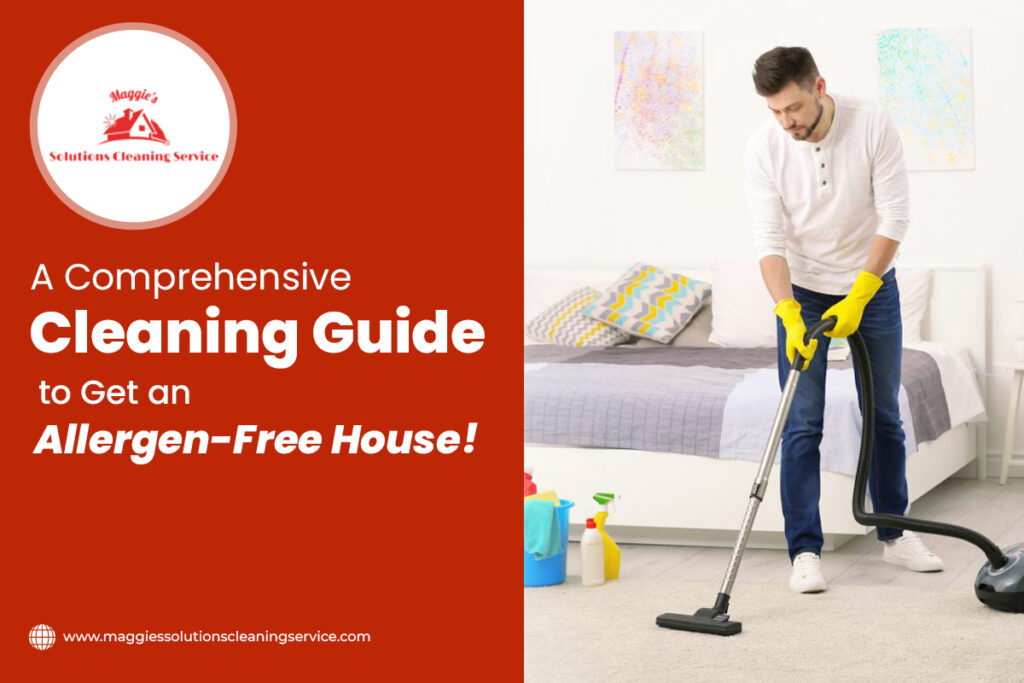Allergen-Free Bliss: Your Ultimate Guide to a Pristine Home
Living with allergies is undeniably a challenging task, especially when allergens lurk within the comfort of your home. So, you need to follow the right measures to get rid of this unwanted hassle that might feel like a hectic task superficially! But the good news? Following the proactive approach and the right cleaning strategies make allergen removal smooth like a breeze! Let’s delve into a comprehensive cleaning guide that will ensure even a minor allergen does not flow under the radar! Keep on reading!
Proven Methods for Keeping Your Home Allergy-Free ( DIY)
- Pay Attention to Allergy Triggers: The first line of defense against hay fever is reducing exposure to allergen triggers. Opt for hypoallergenic bedding, using washable materials and changing sheets weekly. Choose blinds over drapes, as the latter tends to collect dust. Consider flooring options like hardwood, tile, or vinyl, which are easier to sanitize than carpets. Keep bathroom towels and mats dry to prevent mold growth.
- Pet Rules: Despite being indispensable parts of our lives, adorable furry friends can exacerbate allergies. Set ground rules by keeping pets out of bedrooms and off the couch. Daily brushing and weekly baths help control pet dander, enhancing the quality of life for pet owners with allergies.
- Declutter: A clutter-free home is an allergy-friendly home. Limit decorative items, store belongings in sealed containers, and avoid cardboard boxes that can harbor allergens and pests.
- Ventilation Matters: Ensure proper ventilation in your home to reduce indoor allergens. Use exhaust fans in bathrooms and kitchens to minimize moisture and prevent mold growth. Open windows regularly to allow fresh air circulation and disperse indoor pollutants.
- Air Purifiers: Invest in high-quality air purifiers to filter out airborne allergens. These devices can significantly improve indoor air quality by trapping particles such as dust, pollen, and pet dander.
Professional Cleaning Services to Prevent Asthma and Allergies
Besides these DIY tricks, you may count on the services professional cleaning companies provide to offer an allergen-free house. Some crucial of them include:
- Home Air Quality Testing: Understanding the composition of the air in your home is crucial for effectively eliminating harmful irritants. Regular air quality testing done by experts of a cleaning company can pinpoint the specific allergens causing asthma and allergy symptoms, guiding targeted cleaning efforts to remove them from your living space.
- Regular Weekly Cleaning: Implementing a consistent weekly cleaning routine significantly reduces allergy and asthma triggers. While dusting and vacuuming, wearing a mask is essential to limit exposure to airborne allergens. After cleaning, leaving the home for a few hours and using an air purifier further minimizes exposure to lingering allergens.
- Mattress Sanitation and Upholstery Cleaning: Considering we spend a significant portion of our lives sleeping, ensuring mattress sanitation and upholstery cleaning is essential. Dust mites, a common allergen source, thrive in mattresses and furniture. Professional cleaning services can effectively address these microscopic bugs, enhancing indoor air quality.
- Rug & Carpet Cleaning: Carpets accumulate dust, dirt, and allergens over time, even with regular vacuuming. For individuals with severe asthma and allergies, professional carpet cleaning is recommended. Trained experts equipped with specialized tools can thoroughly clean carpets, providing a deeper and more effective cleaning compared to standard home vacuums.
- Air Duct Cleaning: Often overlooked, cleaning your home’s ducts is a valuable service that promotes healthy living. Professionally cleaned air ducts not only contribute to cleaner air but also increase the efficiency of your HVAC system, offering long-term benefits for both your health and your wallet.
- Mold Testing & Mold Removal: Mold is a potential health hazard and can exacerbate asthma and allergy symptoms. If mold is suspected, it’s crucial to contact professionals for mold testing and removal. Immediate remediation is necessary to safeguard health and maintain a clean indoor environment.
- Soft Surface Sanctuaries: Unlike clothes that can be readily laundered, office textiles demand a different approach. Embrace soft surface sanitization using cutting-edge technology and antimicrobial solutions on drapes, rugs, carpets, and upholstery. This proactive measure in your office’s cleaning playbook ensures a healthy haven for your team, especially during the onslaught of spring allergies.
Get a Trusted and Experienced cleaning Services
Hence, don’t bother about the hazardous allergy issues anymore! Embrace the scientific and logical cleaning methods, keep your trust in the expert cleaners of a reputable company and transform your home into an allergy-free sanctuary with ease. And to get top-notch cleaning services from the pros, deal with the expert cleaning pros at Maggie’s Cleaning who have long years of practical experience and can provide tailored cleaning services.
What is the Most Useful Way to Get Rid of Allergens?
The optimal method for allergen removal involves the use of wet cloths and wipes, surpassing the efficacy of dry wipes. Preliminary food prescribing enhances allergen removal during the full cleaning process. Moreover, storing cloths in a sanitizer solution proves effective in minimizing allergen transfer between surfaces, ensuring a thorough and efficient cleaning approach.
Do dust mites inhabit all households?
Regardless of cleanliness efforts, it’s probable that most homes accommodate these microscopic creatures. Even in apparently dust-free spaces, unseen particles often serve as a habitat for dust mites.
Can air purifiers eliminate allergens?
Answer: Thankfully, air purifiers prove efficient in removing dust, including allergens from dust mites, providing relief for easier breathing. Notably, these purifiers are particularly helpful during sleep and when dust is disturbed, such as during bed-making.
What signs indicate a dust mite infestation?
Answer: In a mild case, occasional symptoms include a runny nose, watery eyes, and sneezing. For severe infestations, persistent sneezing, coughing, congestion, facial pressure, or even severe asthma attacks may occur. Individuals with asthma sensitive to dust mites are at an elevated risk of asthma attacks.

